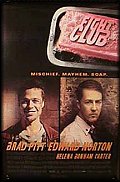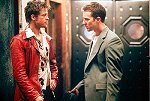Fight Club
 for disturbing and graphic depiction of violent anti-social behavior, sexuality and language.
for disturbing and graphic depiction of violent anti-social behavior, sexuality and language.
Reviewed by: Jason Murphy
CONTRIBUTOR
| Moral Rating: | Extremely Offensive |
| Moviemaking Quality: |
|
| Primary Audience: | Adults |
| Genre: | Thriller / Satire |
| Length: | 2 hr. 19 min. |
| Year of Release: | 1999 |
| USA Release: |

Nihilism (Wikipedia)
How can we know there’s a God? Answer
What if the cosmos is all that there is? Answer
If God made everything, who made God? Answer
Are you good enough to get to Heaven? Answer
Should I save sex for marriage? Answer
How can I deal with temptations? Answer
How far is too far? What are the guidelines for dating relationships? Answer
What are the consequences of sexual immorality? Answer
VIOLENCE—How does viewing violence in movies affect families? Answer
| Featuring |
|---|
| Brad Pitt, Edward Norton, Helena Bonham Carter, Meat Loaf, Jared Leto, Zach Grenier, Eion Bailey, Ezra Buzzington |
| Director |
|
David Fincher |
| Producer |
| Distributor |
“We are the middle children of history. We have no unifying cause. We have no Great War, no Great Depression. Our Great War is a spiritual war. Our Great Depression is our lives.” —Tyler Durden, waiter, underground cult leader, anarchist extraordinaire
“Fight Club” is probably the definitive film of generation X, Y (or whatever generations people under the age of 35 belong to). It is shocking, disturbing, possibly dangerous. But I haven’t seen any film recently (even “American Beauty”) that explores the ills and shortcomings of our society so intelligently and so well.
Edward (I’d like to thank the Academy…) Norton gives a phenomenal performance as the nameless narrator of the film. He’s a wage slave for a major automobile company, disgusted with his job (he calculates the cost of auto recalls; if the cost of recalls is more than the probable out of court settlement, the company keeps the dangerous cars on the road). Feeling alienated from everyone, he frequents cancer support groups for fellowship (when people think you’re dying, they give you their complete attention). However, his life takes a turn for the weird when he meets two people: Marla Singer, another support group “tourist”, who threatens to expose him, and Tyler Durden (Pitt), an anarchic genius. Tyler taps into the frustration of young disenfranchised males, starting up underground fight clubs.
At fight club, men pair off and beat each other in a cathartic release of their frustrations. Soon, Tyler is starting up fight clubs all over the country, building up a cult-like army with which he can overthrow the consumer society he so vehemently decries.
Technically, this movie is as close to flawless as they come. The three lead actors (Norton, Pitt, Carter) all give top-notch performances. Enough said.
What is much more interesting (and disturbing) about this movie are the ideas driving it. “Fight Club” is full of horrifying violence, but I do not believe that it is gratuitous or mindless. Nor does “Fight Club” glorify the violence it portrays. With tragedies like Columbine occurring semi-regularly in our society now, “Fight Club” could not be more timely. It strives to show where the violence comes from, what makes it attractive to the individuals responsible for it. Tyler, in one of his many philosophy-laced monologues, says “we’re all raised by television to believe that one day, we’re all going to be millionaires, movie gods and rock stars… but we won’t. And we’re figuring that out now.” In the face of this society, many people feel impotent, unable to change their lives. They feel owed. And, like it or not, violence is one way to exert at least a small amount of control over the people around them, if only for a brief time.
There are many lines and ideas in “Fight Club” that hit the nail on the head. Unfortunately, many other parts of the movie are exceedingly dark and offensive. There is sex and nudity both implied (through sound) and shown onscreen (including a frame of a picture, seen twice, of an erect penis). A lot of profanity. And the other part of Tyler’s worldview, though not fully espoused by the movie as a whole, is exceedingly nihilistic. Not that the nihilism is particularly surprising; it seems to be rampant everywhere in today’s society in many different forms. One exchange: “Your father was your model for God. And if your father bails out, what does that tell you about God? Our fathers were our models for God. My dad bailed on me; just walked away from the family when I was six.” Unfortunately, God is the last place these people think of looking.
“Fight Club” is also a cautionary tale. It highlights the dangers of blindly following a figure (Tyler, here) no matter how charismatic. Comparisons to the rise of fascism are totally justified. Here is also the real danger of the film. Those going to films as pure entertainment will probably not feel the need to analyze the themes running through “Fight Club”, and hence could walk out buying Tyler Durden’s nihilism hook, line and sinker; many of his arguments are pretty persuasive.
I’m guessing that this movie really won’t resonate with people above the age of 40, but many between the ages of 20 and 30 will really be able to identify with a lot of the feelings here. And I think it’s a movie most people should steer clear of. Especially if you are not willing to really analyze and think about the film when the lights come up. “Fight Club” is definitely a film that demands it.


As 2000 bound missionaries fighting spiritually in our American backyard for souls, “Fight Club” helps us identify with our field! We are facing a generation only yearning for Christians to become more contextualized in their approach to dealing with life. I agree with Murphy. We who “see” and “hear” can harvest positive motivation from the movie if we are quick to seek God’s discernment and seek prayerfully to flush out the negative aspects. (By the way, the Spirit caused me to close my eyes right before and on through the sex scenes! I know, it is not a healthy excuse…) Yet, I personally came away with a desire to fully consider the implications of what a serious fight goes on, not only up in the heavenly realms—Eph. 6 style, but internally as every soul we witness to contemplates the Way to eternal life. How did I get that motive?
Did you recognize the spiritual relationship between the protagonist and Tyler. It seems strange no one has mentioned so far—Tyler is spirit if you reflect far enough. Was it not clear Tyler is either an alter ego, alter personality or say a demonic force? Although I may be accused of isogesis (reading into the movie too far), it seemed more than plausible, the writers of “Fight Club” were developing Tyler as a demonic force that spurs our hopeless protagonist to lead men into a pseudo-freeing private fight club.
Study the movie in retrospect after realizing the implications of the murder of Tyler in the end. Here’s the reasoning: Tyler is portrayed as an evil counterpart to Jesus Christ. Tyler is a spirit driving out fear and bringing in glory to men especially in his inter-dependent (maybe co-dependent) man at the cost of his own “life.” Tyler provides him his own rendition of an evil form of “grace” as Tyler pounds his Earthly counterpart’s feelings of depravity and lack of significance (literally) out of him. He becomes the catalyst of a weakling’s metamorphosis to fame and power in the world system.
Moreover, Tyler is a blasphemous character, causing the club to spill plenty of blood so as to provide an false atonement for their slavery to sin. You see fighting is the enthusiastic diversion from their greatest need—a need we Christians have fulfilled here on the other side as we are in Christ.
, Tyler’s bullet in the head was the sacrifice for his “friend's” glory making his character more antichirst-like than ever. One take of many I am sure… At the very least, “Fight Club” is a motivating point of my discipleship to Jesus. But, like many who have written in, I would be careful who to recommend this movie to, since the shallow—especially are more likely to foolishly buy into Tyler’s charismatic character. Last comment—as for character development—possibly the best this year. [3/4½]
As far as a Christian perspective on the movie, the violence was rather graphic, but from the perspective of one who just CANNOT watch gore I actually got through this movie with no problem. The fact that the violence was not gratuitous, and actually added to the plot (which violence rarely does to most horror and gory movies). Yes, the movie was nihilistic, but I realized that this is exactly the paradigm I would accept if I did not know the saving grace and love of Jesus Christ.
The movie also spoke volumes of the vain futility of materialism and allowing our job and possessions to define, and ultimately possess us. Since the movie was not written by Christians (I presume), the ultimate answer (Jesus Christ) was obviously not portrayed in the film, but this isn’t surprising in the secular film industry, and please don’t let this fact influence your decision to view the film.
Actually, despite its lack of Christianity, the film was refreshingly honest in its negative views of what our materialistic society has become. I also like the fact that the film doesn’t pretend to give us the answer, leaving that up to the viewer to discover for himself. So use this opportunity to show your unsaved friends the true futility of life without Jesus Christ.
I would not advise that teenagers or children under 16 watch this movie (actually, I wouldn’t recommend that children watch it at all) without their parents, but if you are looking for a deep, philosophical, moving film to watch this weekend, I heartily recommend “Fight Club.” [3/5]
Though I am against violence I don’t make a drama when I see most scenes, but I have never seen a movie which depicts violence and bad social behaviour in such a glorified, real way. Obviously this has consequences, but not the ones you expect to have in the real world… Though there’s a reflection about consumerism in the movie, the message which many young ones will get is: violence is so funny, you can take out your frustrations with it. Violence makes me the hero. If you were asking me my opinion, I wouldn’t see this movie. [1½/3½]



I know that the film is controversial, and for me personally it had to pass my own moral barometer to give a year and a half of my life to editing it. I feel that there is a place for disturbing material thoughtfully presented. People can choose not to see it, but it should be allowed (despite what the Hollywood reporter thinks!).
I feel that real faith can withstand challenges, and in fact is made stronger by real, challenging examination. I’m very proud of this film, both in terms of content and craft, and I’m disappointed that so many people were discouraged from seeing it by those with their own agendas. I’ve seen it be a great starting point for many conversations, conversations this country desperately needs to have more of, in my opinion…